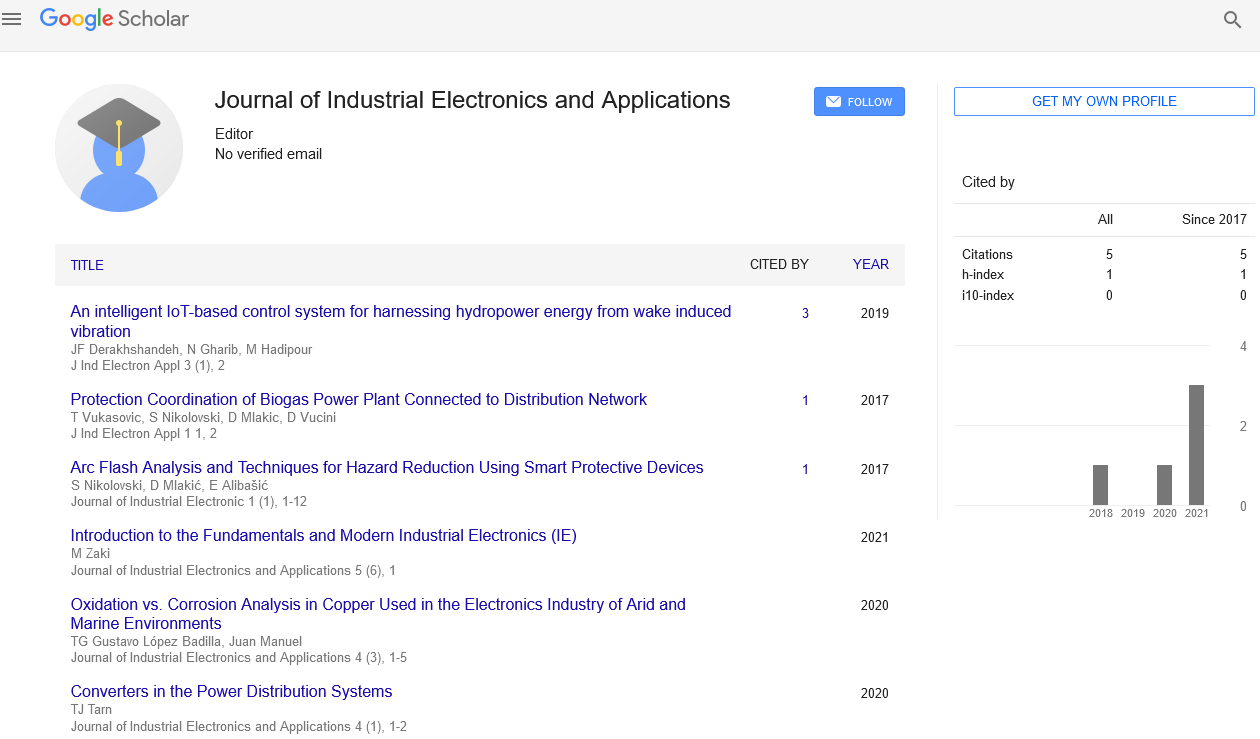Commentary, J Ind Electron Appl Vol: 7 Issue: 4
Exploring Hybrid Intelligence: An In-Depth Analysis of GSAPSO in Computational Optimization
Victor Filipowski*
1Department of Electrical and Computer Engineering, Ryerson University, Toronto, Canada
*Corresponding Author: Victor Filipowski,
Department of Electrical and Computer
Engineering, Ryerson University, Toronto, Canada
E-mail: filipvict1392@gmail.com
Received date: 01 November, 2023, Manuscript No. JIEA-23-124008;
Editor assigned date: 03 November, 2023, PreQC No. JIEA-23-124008 (PQ);
Reviewed date: 20 November, 2023, QC No. JIEA-23-124008;
Revised date: 27 November, 2023, Manuscript No. JIEA-23-124008 (R);
Published date: 04 December, 2023, DOI: 10.36648/JIEA.1000047
Citation: Filipowski V (2023) Exploring Hybrid Intelligence: An In-Depth Analysis of GSAPSO in Computational Optimization. J Ind Electron Appl 7:4.
Abstract
The optimization of complex problems across diverse domains has been a constant pursuit in the realm of computational intelligence. Hybridization of optimization algorithms has emerged as a promising approach to leverage the strengths of different techniques. One such hybrid algorithm gaining attention is the Genetic Algorithm-Particle Swarm Optimization (GSAPSO) hybrid.
Description
The optimization of complex problems across diverse domains has been a constant pursuit in the realm of computational intelligence. Hybridization of optimization algorithms has emerged as a promising approach to leverage the strengths of different techniques. One such hybrid algorithm gaining attention is the Genetic Algorithm-Particle Swarm Optimization (GSAPSO) hybrid. This article explores the fundamentals, working principles, and advantages of the hybrid GSAPSO algorithm, shedding light on its potential for addressing intricate optimization challenges.
Genetic Algorithm (GA) and Particle Swarm Optimization (PSO)
Genetic algorithm: Genetic Algorithms draw inspiration from the process of natural selection. Solutions to a problem are represented as individuals in a population, and the algorithm evolves the population through processes such as selection, crossover, and mutation. GAs are known for their global search capabilities and ability to explore diverse solution spaces.
Particle swarm optimization: Particle Swarm Optimization is inspired by the social behavior of birds and fish. In PSO, a population of particles moves through the solution space, adjusting their positions based on their own best-known positions and the global best-known position. This collaborative approach facilitates rapid convergence toward optimal solutions.
The genesis of GSAPSO
The idea behind the GSAPSO hybrid is to integrate the global search capabilities of Genetic Algorithms with the rapid convergence and local search capabilities of Particle Swarm Optimization. By combining these strengths, the hybrid algorithm aims to strike a balance between exploration and exploitation in the optimization process. In the GSAPSO hybrid, the algorithm begins with the initialization of a population of solutions, akin to the start of a typical GA. Genetic operations such as selection, crossover, and mutation are then applied to evolve the population. Subsequently, the PSO phase takes over, allowing particles to adjust their positions based on the genetic evolution. The synergy of GA and PSO in GSAPSO often results in enhanced convergence speed. While the GA phase explores the solution space globally, the PSO phase exploits promising regions identified by the genetic operations. This dual-phase approach accelerates the optimization process. Genetic Algorithms are known for their ability to maintain diversity in the population, preventing premature convergence to suboptimal solutions. By incorporating this feature into the GSAPSO hybrid, the algorithm can effectively explore a broader solution space and avoid getting stuck in local optima. The hybrid GSAPSO algorithm exhibits robustness across different types of optimization problems. Its adaptability to diverse problem landscapes makes it a versatile choice for addressing real-world optimization challenges in fields ranging from engineering and finance to artificial intelligence.
Applications of GSAPSO Hybrid
GSAPSO finds applications in engineering optimization problems, such as parameter tuning in complex systems, structural design, and resource allocation. Its ability to balance exploration and exploitation makes it effective in tackling multidimensional and nonlinear optimization tasks. In the realm of data mining and machine learning, GSAPSO can be employed for hyperparameter optimization, feature selection, and model tuning. Its capacity to navigate large solution spaces proves beneficial in enhancing the performance of learning algorithms. GSAPSO holds promise in financial portfolio optimization, where the goal is to allocate assets effectively to maximize returns and minimize risk. The hybrid algorithm's ability to handle diverse investment scenarios makes it a valuable tool for financial analysts.
Challenges and future directions
Like many optimization algorithms, the performance of GSAPSO is influenced by parameter settings. Ongoing research focuses on refining parameter values and developing adaptive strategies to enhance the algorithm's adaptability to different problem domains.
As optimization problems grow in complexity and dimensionality, scalability becomes a challenge. Future developments in GSAPSO may involve strategies to enhance scalability, making it applicable to high-dimensional optimization tasks.
Conclusion
The hybrid GSAPSO algorithm represents a significant step forward in the quest for efficient and effective optimization tools. By combining the global exploration capabilities of Genetic Algorithms with the rapid convergence features of Particle Swarm Optimization, GSAPSO offers a versatile solution to a myriad of optimization challenges. As researchers continue to delve into its working principles, refine parameters, and explore new applications, the hybrid GSAPSO algorithm stands as a promising contender in the evolving landscape of computational intelligence and optimization methodologies.
 Spanish
Spanish  Chinese
Chinese  Russian
Russian  German
German  French
French  Japanese
Japanese  Portuguese
Portuguese  Hindi
Hindi 